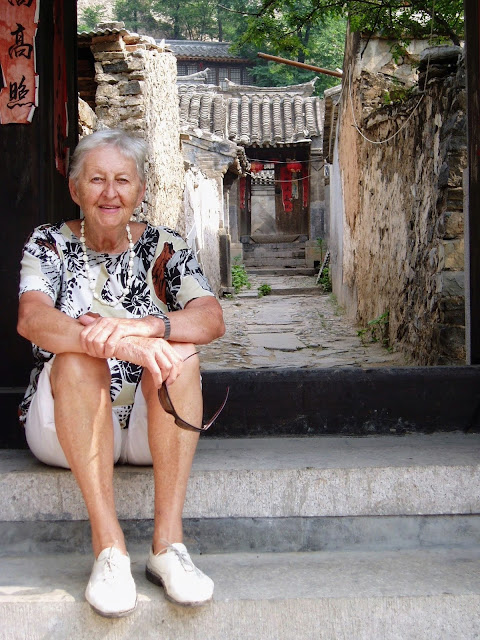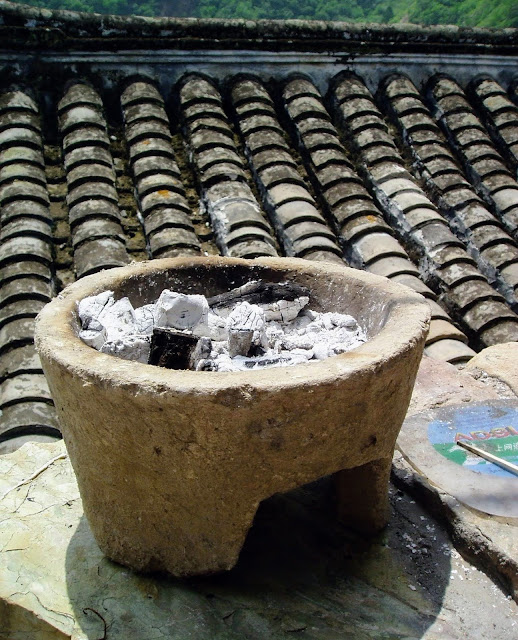Chuan Di Xia - Of Rooftops and Rocks
We knew the ninety-kilometre journey through the steep mountain passes would be terrifying at times. Most of the time. We knew the extreme temperatures would challenge our bodies and our moods. We knew there was no hot water. We understood the condition of the local ablutions. We knew humanity would arrive en masse, sooner or later, drowning out any semblance of tranquility. Yet, we headed out to the village in the mountains time and time again.
Ever since a journalist friend of ours introduced us to Chuan Di Xia, many years ago, we made the journey to escape the pollution and madness that was Beijing. Our demanding jobs, the high levels of stress and the inevitable crowds with whom we shared space, fed our desires to head out. To quietude. In the beginning, the village was ours to love and appreciate. Years later, the hysterical crowds would arrive in busses whilst we escaped back to the polluted city.
Chuan Di Xia is an ancient village dating back to Ming Dynasty (1368–1644). Established by members of the Han family, the village offers a most unique experience. That of stepping back in time. To witness living history. The village was declared the top-ranking historical village in all of China in 1990. Residents opened their homes to visitors to create funds and to share the magnificence of the place. Each one of the original seventy courtyard homes does justice to a rich heritage. To a past filled with destruction and untold suffering. The village was badly damaged during the Japanese occupation of 1937. Later in years, The Cultural Revolution too, left deep scars in the village. Evidence of the turmoil can still be found around the village. On the walls. Within the fallen rocks of destroyed buildings. At times, whilst sitting quietly under the full moon, I could almost feel the torment of the past. Such deep sadness continues to haunt the rooftops and the rocks.
Despite a history scattered with pain and misery, Chuan Di Xia supported the villagers in their quest to become wealthy. And this they did. The village boomed in the late Qing Dynasty (1644-1911) from producing rice, fur and coal. The products brought wealth, resulting in the beautiful homes being built. Smothered in charm and character, each home continues to provide and safeguard the space for future generations. Provided enough respect and protection is given to the village by all.
My deepest gratitude is for the fact that I was able to share this wonderful place with my family, as they journeyed to China, through the years, to share our world. Together we enjoyed the magnificent flowers and greenery that seemed to spring through those ancient rocks. There was always beauty to be seen. No matter how small it was. At times, simply finding a rock on which to sit and stare out into nothingness, was utter bliss. Allowing oneself to be completely lost in one’s imagination. The village was our happy place.
In winters, Chuan Di Xia was brutally barren. The local folk sat for hours absorbing the weak winter sunshine. A habit I happily enjoyed too. The nights were insufferably cold. Water poured on the ground outside froze within minutes. Brushing our teeth was agony unless we used boiled water from the kettle. Layers upon layers of the thick appropriate clothing covered our bodies when taking brief walks to find food. Or better still, braving the icy cold to simply enjoy the expansive open spaces surrounding the village. Serenity held us in her arms. The coldness firmly kissed our faces, gifting us a dash of renewed energy.
Looking back on our bedroom one bitterly cold morning, we were transported to a fantasy world of sorts. Having checked in to our room the night before, we were oblivious to where exactly the room was situated. Forming part of an incredibly high castle made of solid rock, our window watched us walk onwards to the next cluster of houses. What it took to build that structure of rock, we will never know. We will never understand the magnitude of difficulties the creators had faced. How many lives that wall had taken.
Walking through the many alleyways, the old traditional world, as it had been for centuries before, greeted us. Simplicity seemed to be of utmost importance. Life was about family, work, nurturing and neighbours.
Nestled at the foothills of the Taihang Mountain Range, the village presented an intricate tapestry of rooftops. They were fascinating. Grey tiles fit snug over one another to create an atmosphere of warmth and togetherness. Each traditional courtyard house supported an enclosed outdoor area. Protecting all that took place within. Forming the heart of each home. Stories and meals were shared there. Children developed and the elders aged within those spaces. Planning and reflection took place amidst the security of the grey rooftops.
It was within such a space that one evening our hosts cooked for us. A meal filled with flavours, with love, with laughter and with garlic. Contraptions of all varieties were used in the outdoor kitchen. Basic in style. But producing delicious meals. Affordable to operate. That night, as we engaged in laughter and conversations which required basic translating and hand signals, my girls and I were given our Chinese names. As our host family were of the Han descendants, our names included Han. What an incredible honour it was to be included in their family. To share their world so intimately. To be so welcomed into a world far removed from our own in Africa.
As Han Yue (Ingrid), Han Jiang (Debbie), Han Xue (Chantal) and my mom, Yvonne, continued embracing the culinary experience that night whilst sharing stories of Africa, the exhausted chef watched us closely from his corner. Clearly satisfied were we that our plates were perfectly empty. Little did we know that one needed to leave a few morsels of food on one’s plate as a sign of enjoying the meal!
The most fascinating and complex gems of the Chinese culture are the characters which make up their script. I admired and respected those works of art every day for eighteen years. Not ever grasping the skills needed to create them. I did witness however, the patience, dedication and passion with which they are created. Of the over 50 000 characters in the language, it is said that the most complex one requires over thirty brush strokes. This exquisite character, a true work of art, means Chuan. It is the first character of the village name and means to pass through.










.JPG)













.JPG)



.JPG)




This is such a lovely mixture of fascinating information and deeply thought contemplation. You have led such a full life, Ingrid xx
ReplyDeleteAgreed with Sian above, find your stories so interesting.
ReplyDelete